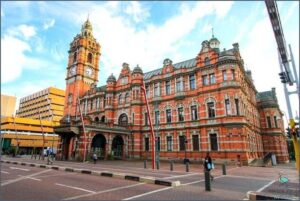
The water in Johannesburg, South Africa, is contaminated with hazardous chemicals and pollutants. The city’s water supply has been contaminated by industrial and agricultural waste, as well as sewage. This has led to a number of water-borne diseases, including cholera, typhoid, and hepatitis. The city is working to improve its water quality, but the problem is complex and will take time to resolve.
Contents
Contaminated Water Johannesburg
The water in Johannesburg, South Africa is contaminated and is a major public health risk. The water is contaminated due to industrial and domestic waste that is disposed of into rivers, streams and other water sources. This has caused water-borne diseases to spread throughout the city, with children and the elderly being particularly vulnerable to this contamination. In addition to water-borne diseases, the contaminated water has also caused an increase in respiratory illnesses and allergies. As a result, the government of Johannesburg has implemented a number of initiatives to improve the water quality in the city, such as introducing water treatment plants, establishing a water quality monitoring system, and developing a water conservation program. However, these initiatives are still in their early stages, so it is important for citizens to take their own steps to protect themselves from the contaminated water.
Causes of Water Contamination – Industrialization, Sewage Treatment, Deforestation
The prevalence of contaminated water in Johannesburg is a cause for great concern. With the ever-increasing industrialization of the city, the sewage treatment system is struggling to keep up with the demands placed on it. This, coupled with deforestation in and around the city, has caused a drastic reduction in the quality of water available for consumption.
Industrialization has long been known to be one of the leading causes of water contamination. From the release of hazardous chemicals and pollutants into the water supply, to the increased demand for water for industrial purposes, industrialization has had a profound impact on Johannesburg’s water quality. As industrial activity continues to increase, the amount of pollutants entering the water supply is only likely to increase.
Sewage treatment is another major contributor to water contamination in Johannesburg. With the growing population, the sewage treatment facilities are unable to keep up with the demand. This results in untreated sewage being directly released into the water supply, thus leading to contaminated water.
Deforestation is also a major cause of water contamination in Johannesburg. With thousands of trees being cut down in and around Johannesburg, the natural filtration systems that trees provide are lost. This results in polluted runoff entering the water supply, thus reducing its quality.
The combination of industrialization, sewage treatment and deforestation has resulted in a drastic decrease in the quality of water in Johannesburg. This has resulted in an increase in cases of waterborne diseases, and a decrease in quality of life for many of the city’s residents. It is therefore essential that steps are taken to reduce the level of water contamination in Johannesburg, in order to ensure the health and well being of the residents.
Effects on the Environment – Pollution, Health Impacts
Contaminated water in Johannesburg is a serious issue with far-reaching ramifications for the environment, health, and the local economy. The city’s water pollution is caused by a variety of factors, including industrial waste, sewage, agricultural runoff, and other sources. In some cases, the contamination is so severe that it has led to a complete breakdown of the local water system.

In terms of its environmental effects, contaminated water in Johannesburg is a major source of water pollution. It has caused a decrease in aquatic biodiversity and an increase in waterborne illnesses. Additionally, the polluted water has led to an increase in algal blooms, which can deplete oxygen in the water and make it unsuitable for aquatic life. Furthermore, the contamination has caused an increase in acidity in the water, leading to a decrease in plant and animal life.
In terms of health impacts, contaminated water in Johannesburg has been linked to a variety of illnesses and diseases, including cholera, typhoid, and even cancer. Contaminated water can also lead to skin and eye infections, as well as gastrointestinal issues. In addition, the water can be a source of toxins and other harmful substances that can cause long-term damage to the body.
Finally, contaminated water in Johannesburg has had a negative impact on the local economy. The city’s water pollution has been linked to a decrease in tourism and a decrease in the number of businesses in the city. Furthermore, the water pollution has also led to an increase in the cost of water-treatment services, which has put a strain on the local economy.
All in all, contaminated water in Johannesburg is a serious issue with far-reaching consequences. The environment, health, and economy have all been affected by the city’s water pollution, and it is essential that the issue be addressed in order to protect the city’s resources and its inhabitants.
Solutions – Water Purification, Improved Infrastructure
In Johannesburg, South Africa, access to clean and safe drinking water is a major issue. The city is home to 6 million people, but many of them lack access to clean, reliable water sources and are forced to rely on contaminated water from streams, rivers and lakes. The water is often polluted with industrial, agricultural and urban runoff, as well as human and animal waste. This leads to a number of health issues, such as waterborne diseases, diarrhea and other illnesses.
To help address this problem, the H2 Solutions water purification system was recently implemented in Johannesburg. This innovative system uses a combination of water filtration, chlorination and ultraviolet light to remove contaminants from contaminated water sources. It also uses a combination of ozone and chlorine to reduce the levels of bacteria and viruses, making it safe to drink.
H2 Solutions’ water purification system has helped to improve the infrastructure of Johannesburg, providing much needed access to clean, safe drinking water. The system is easy to use and requires minimal maintenance. It can also be used in combination with other water treatment systems, such as reverse osmosis, to further improve the quality of drinking water.
H2 Solutions’ water purification system has been a major success in Johannesburg, and is helping to improve access to clean, safe drinking water for the city’s residents. It has also improved the overall infrastructure of the city, providing a much needed boost to the local economy. This innovative system has been a major benefit for the people of Johannesburg, and is a shining example of how technology can be used to help improve the lives of people around the world.
Conclusion
The water crisis in Johannesburg is a serious issue, and needs to be addressed as a priority. With the city’s population growing and the water resources becoming more scarce, the crisis is only going to get worse.
There are a number of ways in which the water crisis in Johannesburg can be addressed. Firstly, the city needs to invest in more efficient water infrastructure. This could include improved water treatment facilities, more pipelines, and better water storage facilities. Secondly, the city needs to develop a water recycling programme. This would involve reusing water resources, either through desalination or through water recycling plants.
Finally, the city needs to increase its water supply. This could be done by developing new water sources, or by increasing the amount of water that is available from existing sources. In order to address the water crisis in Johannesburg, all of these measures need to be taken.




